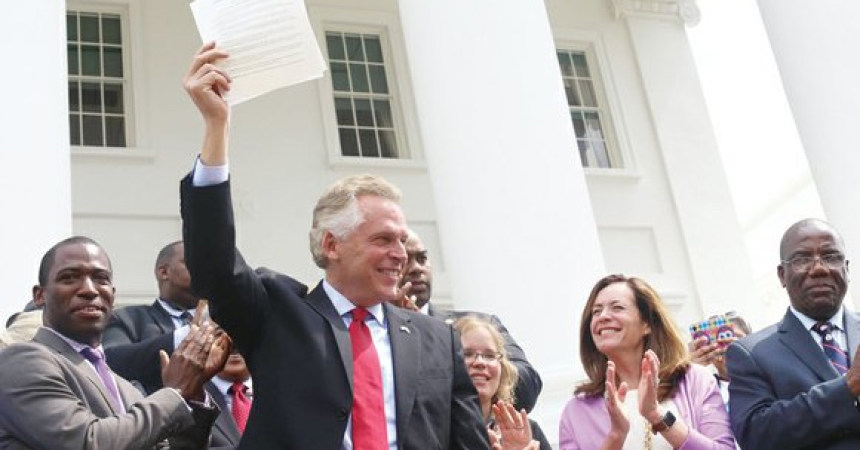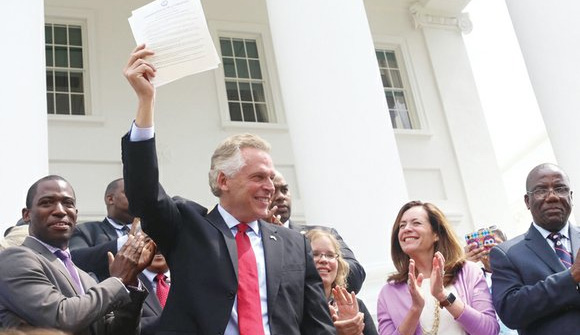
Gov. Terry McAuliffe restores voting rights of 206,000 Virginians, including disenfranchised African-Americans

Gov. Terry McAuliffe triumphantly holds up the historic order he signed last Friday outside the state Capitol
PHOTO: Michaele White/Governor’s Office
By Jeremy Lazarus
Special to the Outlook from Trice Edney News Wire
David Mosby no longer feels like a second-class citizen.
After years of being barred from the ballot box because of his criminal record, the 46-year-old home improvement contractor is finally able to vote and fully take part in the life of his community.
“I never thought I’d have this opportunity,” said the teary-eyed Varina resident, one of more than 200,000 Virginians whose lives have been changed with a stroke of Gov. Terry McAuliffe’s pen.
Gov. McAuliffe has gone further than any state chief executive to eliminate the last big barrier to voting in Virginia — a felony conviction.
He signed an order restoring the right to vote to anyone who had completed a prison term as well as any probation or parole requirements as of April 22.
The change also allows the former felons to serve on a jury or to run for political office.
Even more stunning, the governor made no distinction between those with records for violent crimes such as robbery and rape and those who committed nonviolent offenses such as fraud and illegal drug use.
The policy change represents a victory for the Virginia State Conference of the NAACP and the American Civil Liberties Union of Virginia, which have been urging such action from the past three governors.
Immediately, state Republican leaders charged that Gov. McAuliffe had overstepped his authority and urged him to call a special session of the General Assembly to review his action, a call he rejected.
Yet despite the GOP backlash, the Democratic governor has promised to update the order monthly to include other Virginians who fully complete felony sentences after April 22.
Essentially, Gov. McAuliffe has transformed Virginia from one of the most restrictive states in restoring citizenship rights. A majority of states allow for automatic restoration of rights once a felon completes his or her sentence. Only Florida, Kentucky and Iowa were like Virginia in barring felon voting unless a governor restored rights.
In a state where 307,000 people with felonies are believed to be disenfranchised, according to the Washington-based Sentencing Project, Gov. McAuliffe stated that his order would impact 206,000 people immediately, possibly half being African-American.
He has rebuffed a request from the General Assembly to release the names and backgrounds of those whose rights are restored. However, newly appointed Secretary of the Commonwealth Kelly Thomasson has put up a searchable database on her office’s website giving individuals the ability to check to see if their rights have been restored.
Should the next Virginia governor rescind the order when he or she takes office in January 2018, state Sen. A. Donald McEachin, D-Henrico, said that Gov. McAuliffe’s action could not be reversed for those whose rights he has restored and who now can register and vote for the next president and for others seeking local and state office.
Before signing the order, the governor said his action would help undo the state’s long history of trying to prevent African-Americans from full participation.
As he and others noted in remarks made on the South Portico of the Virginia Capitol, African-Americans did not gain full voting rights until 1965, when Congress passed the federal Voting Rights Act.
Virginia’s Constitution has prohibited felons from voting since the Civil War, helping to reduce African-American influence at the polls. Those restrictions were expanded in 1902 as part of an updated state Constitution that included poll taxes and literacy tests that were not eliminated until the passage of the Voting Rights Act.
In researching the provisions, aides to the governor turned up a 1901 quote from a principal author of that Constitution, Lynchburg state Sen. Carter Glass, noting that its voting provision would “eliminate the darkey as a political factor in this State in less than five years, so that in no single county of the Commonwealth will there be the least concern felt for the complete supremacy of the White race in the affairs of government.”
As Gov. McAuliffe noted, “Too often in both our distant and recent history, politicians have used their authority to restrict people’s ability to participate in our democracy,” he said.
“Today we are reversing that disturbing trend and restoring the rights of our fellow Virginians who work, raise families and pay taxes in every corner of our Commonwealth.”
The right to vote “is the essence of our democracy and any effort to dilute that fundamental principle diminishes it for all of us,” he said, in addressing the crowd of more than 100 people, including ex-convicts like Mr. Mosby, as well as supporters of his executive action like Congressman Robert C. “Bobby” Scott and seven Democratic members of the General Assembly.
“This makes me feel so good,” said Darlene Jewell, 61, of Richmond, who, for the first time, signed a voter registration application. Her checkered past had ensured she could not vote until now.
Other speakers added their words of support, including former Secretary of the Commonwealth Levar Stoney, who helped the governor reach this step before stepping down from his post to run for mayor of Richmond; his successor, Secretary Thomasson; and the Rev. Benjamin Campbell, former director of the ecumenical Richmond Hill retreat center in Church Hill; and Raja Johnson, a 40-year-old Richmond mother who spent two years in prison. Her rights were restored in 2014, more than 15 years after being convicted of grand larceny. She now is completing her associate degree in medical technology.
How many of the people whose rights have been restored will register to vote is unknown. An early estimate from the Center for Politics at the University of Virginia suggested about 35 percent, or about 72,000 people of those whose rights were restored by the governor. That represents 1.3 percent of the 5.3 million Virginians currently on the state’s voter rolls.
In Richmond, as well as most communities, there is no data on the number of people with felony records or the number affected by the governor’s order.
However, Census data and other information can provide a guess. Currently, 134,500 people are registered to vote in Richmond, state figures show. The city has about 179,000 people of voting age, 18 and over, according to the U.S. Census, a difference of about 44,500.
According to the Sentencing Project, 20 percent of African-Americans in Virginia cannot vote because of felony records. Applying that percentage to Richmond’s population, which includes about 107,000 African-Americans, at least 15,000 and possibly more of those 44,600 unregistered people would have felony records. Non-citizens and college students who maintain residences in other states would be among the rest.
Advocates such as Richard Walker, founder and chief executive of Bridging the Gap in Virginia, a felon support and advocacy group, are planning to step up efforts to find people who now qualify to vote.
However, he noted that the governor can only go so far and that his action would not expunge felony convictions, leaving most of the beneficiaries still struggling to find housing or an employer willing to give them a second chance.
Ms. Jewell agreed, saying that the action is unlikely to make employers hire her after seeing her criminal record.
“I wish it would,” she said, “but I’ll take what I can get.”
The question of the governor’s authority to undertake such a sweeping action is sending people to read Article 5, Section 12 of the state Constitution which spells out the governor’s clemency power.
A strict reading of that section indicates that the governor’s power to “remove political disabilities,” as restoration of rights is called, is unfettered, according to Secretary Thomasson.
Removal of political disabilities is not on the list of items the governor must report on a case-by-case basis to the General Assembly. The Constitution states the governor must report to the General Assembly the particulars of each case in which he uses his authority to grant pardons, issue reprieves, commute sentences or reduce or eliminate fines and penalties.
Secretary Thomasson said the governor sidestepped the reporting requirement by keeping intact the obligation of those with restored rights to pay court fines, fees and penalties. That obligation is unchanged, she said.
Instead, the governor decoupled the obligation to repay, said Congressman Scott. The governor said such debts would constitute “a poll tax” if they were used to block the right to vote, the congressman said.
Away this week on a trade mission, Gov. McAuliffe said he was assured by state Attorney General Mark Herring and the author of the current state Constitution, University of Virginia law professor A.E. “Dick” Howard, that he had authority to take executive action.
Through a spokesman, Mr. Herring confirmed his support: “We believe that the Constitution provides sufficient authority for the governor’s restoration order and are prepared to defend it in court if necessary.”
Republican Delegate Bob Marshall of Prince William County, however, has asked Mr. Herring to issue a formal, written opinion to spell out that view.
Howard did not respond to a request for comment, but has previously written in his commentaries on the state Constitution that governors have considered the restoration of rights “on an individual basis.”
Others who have reviewed that section of the Constitution agreed. Paul Goldman, a former state Democratic Party chairman who served on a panel that then-Attorney General Ken Cuccinelli created in 2013 to find ways to expand restoration of rights, said that was the conclusion the panel reached. Everyone on the panel “who looked at it agreed the governor could not” issue a blanket restoration.
Among those gasping at the governor’s action is Republican House Speaker William J. Howell.
“I am stunned at (the governor’s) broad and unprecedented view of executive power, which directly contradicts how past governors have interpreted their clemency powers. And I am stunned at his willingness to restore the rights of the most heinous criminals without batting an eye.”
Speaker Howell went further to claim the governor was simply trying to make it easier for his friend, Democratic presidential candidate Hillary Clinton, to win Virginia. The governor denied that charge, saying that “there are elections every year in Virginia,” and that his action was based on principle, not partisanship.
Since taking office in 2014, Gov. McAuliffe, with the help of Mr. Stoney, already had gone further than any previous governor in restoring rights. As of this year, he had restored the rights of 18,000 people, particularly after eliminating in 2015 a requirement that felons had to repay court debts before their rights could be restored and after changing drug crimes to nonviolent offenses.







